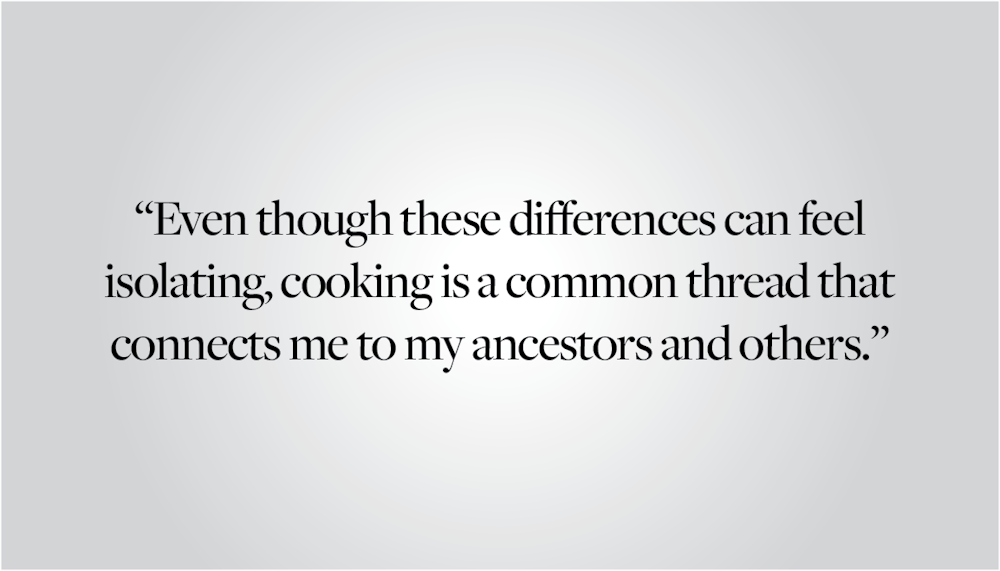Sushi is one of the first solid foods I remember tasting. At two years old, I would run across the checkered tile floor of the kitchen and cling to my mother’s apron as she made sushi to bring to social gatherings. By elementary school, she would regularly pack sushi for my lunch. The other kids at the lunch table would make fun of my food, deeming it “smelly” and “gross.” I felt bad for them. I had the privilege of eating sushi — rolled to perfection by my mom — for lunch while they were stuck with Lunchables or peanut butter and jelly sandwiches. My friends became intrigued by this contrast. Weeks of complaints suddenly melted into curiosity. I let a few of them try one of my delicious rolls despite feeling reluctant to give up any pieces at all. From that day forward, they defended my sushi lunches, asked for a piece whenever I had sushi for lunch and requested that my mom pack extra for them next time. For the first time in my life, I realized that the foods I ate at home were different from what my peers ate at home, but my sushi lunches helped me foster pride in my culture. Food not only deepened my appreciation for my culture but also was a comforting foundation as I explored my identity amidst diverse communities and discovered my unique differences within them.
At the end of high school, my grandma moved in with my parents and I. It was difficult to see her memories of Japan fade with dementia, but she never forgot her love for food. Before she passed, she taught me the same technique she had once taught my mother: how to roll sushi and onigiri perfectly. First, you wet your hands and cover them in salt, so the rice doesn’t stick. Then, you fold the filling into the rice, creating a triangle with rounded edges if you do it in just the right way. Finally, you wrap the rice roll in a small piece of seaweed. After I learned to follow her instructions, my grandma told me that I was making sushi just like she did. When my grandma passed away, I felt that my only connection and understanding of my Japanese heritage was broken. I worried that without her, I wouldn’t know what it meant to be Japanese. As a high school graduation gift, my mom got me a bamboo mat and a rice cooker to roll my own sushi in my dorm room. The gift allowed me to continue the sushi-making tradition and deepen my connection to my mother and grandma.
Nanny, my father’s mom, used to make potato salad for every family gathering. On the food table at family reunions, there were always two different platters of mac and cheese, three trays of fried chicken and two bowls of pasta salad but only one bowl of potato salad. Everybody knew that Nanny’s was the best. In second grade, my classmates and I were tasked with documenting a family recipe for a school project. I decided to learn how to make Nanny’s famous potato salad. When I walked in with my carefully crafted bowl, I noticed that other students had brought in mostly cookies and cakes. I was suddenly struck by how the egg and mayonnaise mixture looked and was fearful of a negative reaction similar to the ones given to my sushi lunches. Immediately, shame washed over me. Why was I embarrassed by something Nanny had made? Potato salad was my favorite dish at Thanksgiving and Christmas, but that day I got up in front of the class and said, “This is Nanny’s potato salad. It has mayonnaise and relish in it so it’s kind of gross.” After my presentation, the only other Black student in my class excitedly came up to try some, saying that potato salad was their favorite. Later, I found that every student in my class liked my dish, but this approval from another Black student, whose family had their own “famous” potato salad, meant the world to me.
When Nanny later got diagnosed with Parkinson’s disease and could no longer chop up potatoes and eggs, I started making potato salad for events. I used to follow her written recipe exactly, but now I add my own favorite ingredients and flavors too. Still, whenever I make potato salad — even when I follow my own adapted recipe — Nanny says my potato salad tastes just like hers. I used to worry that I didn’t inherit Nanny’s ingredient-cutting skills or my grandma’s meticulous care when handling sushi rice, but I no longer feel limited by people’s reactions to the flavors and cuisines my family holds dear.
It is through my differences from those around me that I’ve developed a deeper sense of my own identity. Food has been a big part of this personal journey; it connects me to the people in my community and myself. Food transcends cultural boundaries: Each meal is both unique to everyone and a shared human experience. Even though these differences can feel isolating, cooking is a common thread that connects me to my ancestors and others. Now, I can share the experience of receiving the end pieces of perfectly rolled sushi or the best bite of potato salad.
Sasha Estice ’24.5 can be reached at sasha_estice@brown.edu. Please send responses to this opinion to letters@browndailyherald.com and other op-eds to opinions@browndailyherald.com.





